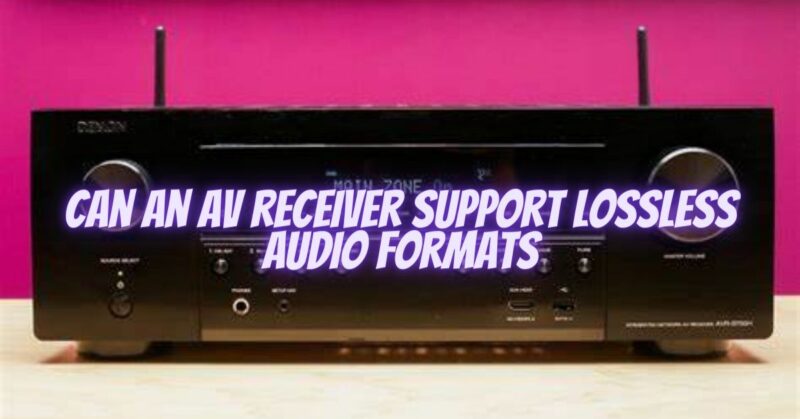The demand for high-quality audio reproduction has led to the development of lossless audio formats, which deliver pristine sound fidelity. AV receivers, renowned for their audio processing capabilities, have evolved to support these formats, ensuring that listeners can enjoy the full richness and detail of their favorite music and movies. In this article, we will explore how AV receivers can seamlessly handle lossless audio formats, providing an uncompromising audio experience.
Understanding Lossless Audio Formats: Lossless audio formats, such as FLAC (Free Lossless Audio Codec) and ALAC (Apple Lossless Audio Codec), compress audio data without sacrificing any of the original audio quality. These formats employ compression algorithms that retain every bit of audio data, resulting in bit-perfect reproduction and preserving the full dynamic range, frequency response, and spatial imaging of the original recording.
Support for Lossless Audio Formats in AV Receivers:
- Decoding Capabilities: Modern AV receivers are equipped with advanced decoding capabilities that can handle various lossless audio formats. These receivers have built-in decoders for formats like FLAC, ALAC, and other popular lossless codecs. This allows them to decode and process the lossless audio streams, extracting the uncompressed audio data for playback.
- Multi-Channel Audio Support: Lossless audio formats often come in multi-channel configurations, such as 5.1 or 7.1 surround sound. AV receivers are designed to accommodate these multi-channel formats, allowing for immersive audio playback with accurate channel placement and spatial effects. The receivers can decode and distribute the individual audio channels to the connected speakers, ensuring a truly immersive surround sound experience.
- High-Bitrate Audio Support: Lossless audio formats typically support high bitrates, ensuring that every nuance of the audio recording is faithfully reproduced. AV receivers are capable of handling high bitrates, allowing for the playback of lossless audio files with the highest level of detail and accuracy. This enables listeners to experience the full depth and resolution of the original recording, appreciating even the subtlest sonic nuances.
- Connectivity Options: AV receivers offer a range of connectivity options to support lossless audio formats. They often feature multiple HDMI inputs, allowing you to connect various audio sources, such as Blu-ray players, media players, or gaming consoles, that can output lossless audio signals. Additionally, many AV receivers provide USB ports, Ethernet connections, or wireless capabilities for streaming lossless audio files from compatible devices or network sources.
- High-Resolution Audio Support: In addition to lossless audio formats, AV receivers are equipped to handle high-resolution audio formats, such as FLAC or DSD (Direct Stream Digital). These formats offer even higher audio quality than CD-quality lossless formats, providing an exceptional listening experience. AV receivers can decode and process these high-resolution audio formats, allowing you to enjoy the full fidelity of these pristine recordings.
Conclusion: AV receivers have evolved to become audio powerhouses that support lossless audio formats, delivering uncompromising sound quality. With their advanced decoding capabilities, multi-channel support, high-bitrate handling, and versatile connectivity options, AV receivers enable listeners to experience the full sonic potential of lossless audio formats. Whether it’s enjoying music in exquisite detail or immersing yourself in the dynamic soundscapes of movies and games, AV receivers ensure that you can revel in the true audio artistry of lossless audio recordings, enhancing your audio journey to new heights of fidelity.


